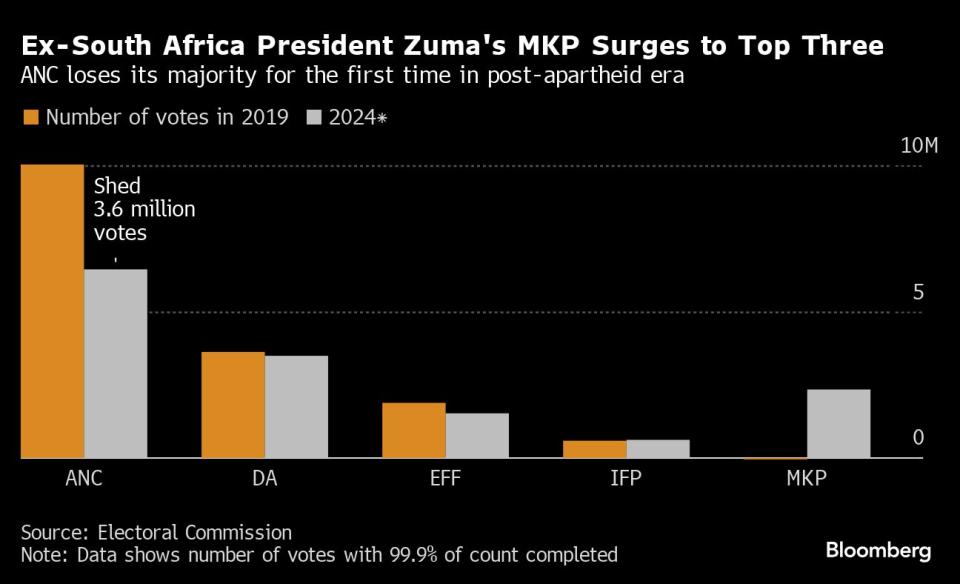Jacob Zuma the Disruptor Has South Africa’s Fate In His Hands After Vote
(Bloomberg) -- Jacob Zuma, who led South Africa for almost nine scandal-tainted years before being ousted by the governing African National Congress, may now play a major role in the country’s political future.
Most Read from Bloomberg
Key Engines of US Consumer Spending Are Losing Steam All at Once
GameStop Shares Surge as Gill’s Reddit Return Shows Huge Bet
Mnuchin Chases Wall Street Glory With His War Chest of Foreign Money
Homebuyers Are Starting to Revolt Over Steep Prices Across US
AMLO Protege Sheinbaum Becomes First Female President in Mexico
Six years after being pushed from office, Zuma successfully upstaged his successor Cyril Ramaphosa in national elections this week, eating into the ANC’s support with his new uMkhonto weSizwe Party. The 82-year-old was feted by jubilant supporters as he walked into the electoral results center north of Johannesburg late Saturday, telling the audience his party’s rise shows “how people are angry.”
President Ramaphosa, 71, has remained out of the public eye and deep in talks since the ANC suffered its worst election result in three decades and lost its parliamentary majority, scraping just over 40% of the vote. Zuma’s MKP seized 14.6% just five months after its launch and wrested control of his home province of KwaZulu-Natal, South Africa’s second-most populous.
The Ramaphosa-led ANC’s “time is up, they can’t stop this momentum,” Zuma said during campaigning last month. “The time has come for a Black person to rise up, to partake in what is theirs.”
During his presidency, Zuma spent years fending off allegations — which he denies — that he took bribes from arms dealers and was involved in siphoning off billions of rands from state transport, power and arms companies. Ramaphosa replaced Zuma as leader of the ANC in December 2017, and two months later succeeded him as president.
Now Zuma is a kingmaker, having brought the ANC to its knees in the election. For the first time, the ANC needs a coalition to govern, but a tie-up with Zuma’s party comes at a steep price - he has one condition to engage with the ANC - that Ramaphosa give up the reins as leader to the organization.
“This is about a man that has been, that feels that he hasn’t been respected as an elder,” political analyst Sanisha Naidu said.
Zuma’s party willing to work with the ANC so long as it has “nothing to do with Ramaphosa,” MKP spokesperson Nhlamulo Ndhlela said without giving further details.
Sign up here for the twice-weekly Next Africa newsletter
That means Ramaphosa is likely to be pushed into the arms of the main opposition Democratic Alliance, a tie-up favored by investors but which faces substantial headwinds within the ANC as well.
It’s a far cry from 2012 when Zuma brought Ramaphosa in from the political wilderness. More than a decade later, Zuma wants to see him ousted, despite denying he has a personal vendetta against his former protege and successor.
His ANC critics say Zuma, a former intelligence chief and amateur chess player, was quietly building up support for his new party within the ANC party’s provincial branch in KwaZulu-Natal right up to the vote, giving him effective shadow control and allowing him the surprise sweeping victory there.
“It looks like we were marching with Zuma machinery on the ground,” Fikile Mbalula, the party’s secretary-general said at a press conference on Sunday. “Our own research did point to dangers, that the ANC would get 43%. All sorts of factors were against us.”
Zuma’s rise is also a mark of how far the ANC has fallen. Voters took their grievances to the ballot box after years of economic mismanagement and corruption — much of it under Zuma’s watch — damaged water and power supplies and with unemployment running above 30%. They opted for a range of opposition parties including the populist Economic Freedom Fighters and Zuma’s MKP, which the ANC concedes it vastly underestimated.
Bloomberg Terminal clients can click on ELEC ZA for more on South Africa’s elections.
ANC councilors in KwaZulu-Natal have already indicated that they will quit should the party move toward teaming up with the Democratic Alliance at a national level.
That means Ramaphosa’s favored coalition, which would in theory bring him out of Zuma’s reach, is “extremely dangerous” for the ANC, political analyst Lukhona Mnguni said. It would risk ceding even more control of a part of the country that’s home to transport corridors, including the major ports of Durban and Richard’s Bay.
“The ANC would have to decide whether it bites the bullet and forgets altogether” about having the province “as part of its structures,” Mnguni said. It would probably be the “death of the ANC” in that part of South Africa.
You can follow Bloomberg’s reporting on Africa on WhatsApp. Sign up here.
--With assistance from Monique Vanek.
(Adds context in paragraph five)
Most Read from Bloomberg Businessweek
Disney Is Banking On Sequels to Help Get Pixar Back on Track
The Budget Geeks Who Helped Solve an American Economic Puzzle
Israel Seeks Underground Secrets by Tracking Cosmic Particles
How Rage, Boredom and WallStreetBets Created a New Generation of Young American Traders
©2024 Bloomberg L.P.




